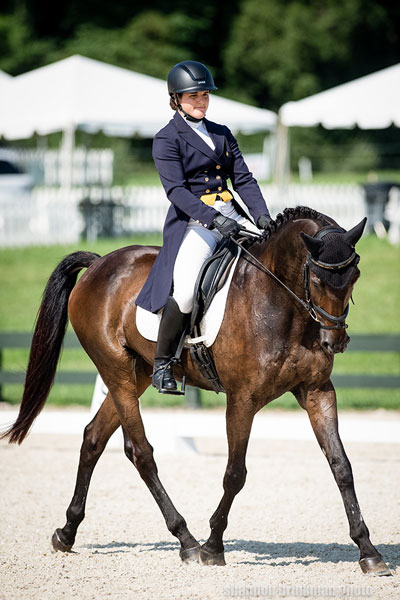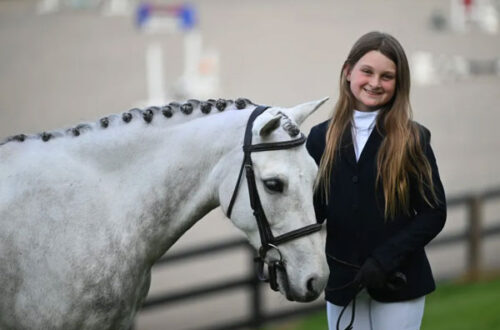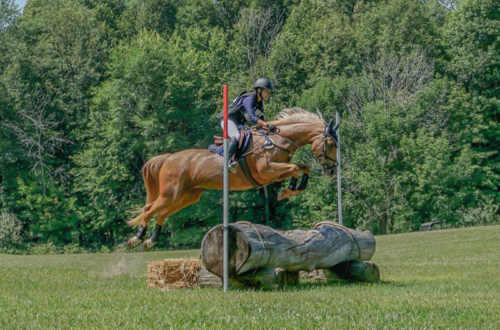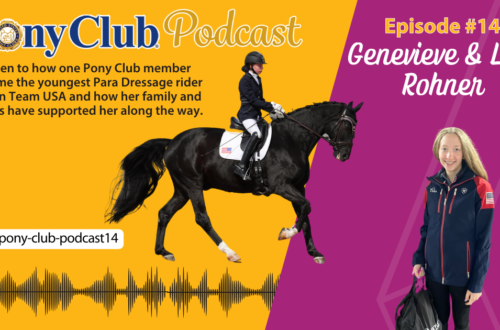
Dear Ema: Getting the A USPC Certification, Getting the Most Out of Pony Club, and Eventing and Dressage Issues
By Ema Klugman, Brought to You by Ride iQ
This column from Ema Klugman, brought to you by Ride iQ, will now be featured on the Pony Club Blog, with this month’s topics discussing whether to get an A Certification from Pony Club, getting the most out of Pony Club membership, how to fix jumping issues in Eventing, and relaxing a horse in Dressage.
Dear Ema,
I am about to graduate from high school and go to college. I got my H-B and C-3 certifications last summer, and I’ve been doing Training Level in Eventing successfully with my off-track Thoroughbred (OTTB). I’m planning to take my horse with me to college and hopefully move up to the Modified level with him this year. When I first joined Pony Club, I had a goal of achieving my A certification, but honestly it seems really difficult, and I’m not sure that I want to do any more certifications. I don’t know if there’s any point in doing them besides telling myself that I accomplished my goals. Should I quit Pony Club and just do eventing?
Sincerely,
Joanna
Dear Joanna,
First of all, congratulations on achieving your H-B and C-3. Those are big milestones in and of themselves, and you should be proud to have gotten to that level.
I would encourage you to continue pursuing your upper-level certifications for a few reasons. First, there is nothing more satisfying than achieving goals you set for yourself. I remember how proud I felt after I passed my A certification. It was a ton of work to climb the ladder and finally get there, but it was so satisfying to check all the boxes.
Second, if you would like to continue climbing the levels in Eventing, training toward the upper-level certifications will be great preparation for the higher levels of Eventing. The Eventing track (formerly called the Traditional track) in Pony Club is modeled after the three phases of Eventing. If you successfully pass the B certification, you should be prepared for the Preliminary Level of Eventing. If you successfully pass your A, you should be about ready to go Intermediate. The certifications are different from competitions, especially because you have to explain to the Examiners why you are doing what you are doing (e.g., explaining your warm-up plan or analyzing how a course rode), but honestly, the extra analysis piece will only help you become a better event rider.
Third, the B, H-A, and A certifications can be simply a really cool experience. For instance, the A certification is all about speaking “trainer to trainer,” so the Examiners will ask you questions about your approach to riding and training horses and how you think about and apply your training philosophy. Putting in the work to prepare for these tests means that you will be not only a better rider, but a better horsewoman.
Fourth, if you plan to stay in the horse industry, your A certification is a great credential. People recognize that only a select few people achieve this high certification, so they respect it. You can think of it like an Eagle Scout credential—it’s well-respected to be an A. The H-A requires plenty of studying about veterinary knowledge and horse care, so it will help you if you end up running a competition barn or riding at the FEI levels.
Finally, the upper-level certifications can open doors for you. Not only will you be more likely to get hired to work in a top barn, but you can also teach clinics or run a certification preparation program for your Pony Club or region. There are also some great opportunities available for people who achieve their upper-level certifications. For instance, in order to participate in the Inter-Pacific Exchange, you must be at least a B. That exchange is a fantastic opportunity to travel to Hong Kong, Australia, New Zealand, or Canada, and you cannot do it without getting that certification.
I use the skills I learned in Pony Club every single day. Whether it is having the confidence to bandage a horse properly after a big event or troubleshoot a training issue that I am having with a particular horse, I rely on the knowledge and practices I learned in Pony Club all the time. If you have the time and opportunity, I would encourage you to shoot for your A!
Best of luck,
Ema
Dear Ema,
My daughter recently joined Pony Club. She is 12 years old. We just moved to a new area, and someone suggested we join the local Pony Club. Where we lived before, my daughter rode at a hunter/jumper barn and did some shows with her pony. Now we are at a boarding barn, and we are kind of on our own because there is no trainer at this barn. What are your recommendations for getting the most out of Pony Club? Should she do certifications or rallies?
Sincerely,
Emily
Dear Emily,
It’s great to hear that you have found Pony Club! It is one of the best ways for young people to get an education in not just horse riding, but horse care. In fact, Pony Club teaches children tons of life skills that they wouldn’t learn in school (and now it also teaches adults, too).
The programs offered by each local Pony Club vary. Some clubs offer subsidized lessons or clinics, while others might focus more on creating teams for rallies. You should talk to the District Commissioner (DC) of your club about what they offer to members.
Pony Club offers certifications help members gain both riding and equine knowledge. Each certification has a rubric (you can find them on the Pony Club website under the Education menu by clicking on Certifications), which outlines the Standards of Proficiency for each level. Think of the certifications like a ladder: you have to start at the bottom and work your way up. The certification progression is as follows: D-1, D-2, D-3, C-1, C-2, H-B, C-3, B, H-A, and A. The H-B and H-A certifications are upper-level Horse Management certifications, so they have no riding component. The certifications also allow members to specialize in a particular area—for example, you can do the Show Jumping track, which does not have cross-country jumping. If your daughter has been doing the jumpers, perhaps she would like to focus on that track.
Rallies are like horse shows for Pony Club members. Your region will likely have a Dressage rally (that could also include Western Dressage), a Show Jumping rally, a Quiz rally, and an Eventing rally. They might also have Mounted Games, Tetrathlon, and even Trail, which is newer. When I was a kid, we participated in all of the rallies. Even though I ended up specializing in Eventing, it was great exposure for me to learn the balance of playing Mounted Games or the versatility of doing a Tetrathlon. Unlike a normal horse show, at a rally, the parents are not involved in helping youth members groom and tack up their horses. This is all up to the kids—they help their teammates prepare and warm up and cool down their ponies or horses. There is also a score received for Horse Management (horse care), so members of Pony Club have to be organized, clean, well turned-out, and prepared (such as by bringing emergency supplies, like a veterinary first aid kit).
You will find that Pony Club is quite different from your old hunter/jumper barn. It is a great way for your daughter to be self-sufficient, learn a ton of knowledge, and also make friends in the horse community. Some of my closest friends were made in Pony Club, and the knowledge I learned through the organization will stay with me for life.
Best of luck,
Ema
Dear Ema,
I’m struggling with my horse in Eventing, especially in the cross-country phase. He stops randomly at different jumps. He is pretty good with ditches, banks, and water, but he is looky at the single jumps, especially if they are a funny color or something. I am getting frustrated, and I’m not sure what to do. He is super-talented over fences, so I don’t know what to do.
Sincerely,
Jake
Dear Jake,
One of the hardest things about riding horses is figuring out how to troubleshoot problems that arise in the training process. This process can be even more frustrating when you have a horse that clearly has the natural talent to do the job, but you seem to be hitting a roadblock. Trust me, any trainer worth their salt has had a horse like this, and we’ve had to figure out how to move forward.
It is good news that your horse seems to be confident at ditches, banks, and water, because sometimes if a horse has a “water issue” or “ditch issue,” those can be harder to solve. It sounds like your horse may just need to develop some more bravery for the single fence that he looks at so that you can rely on him to jump them consistently.
To accurately assess your situation, I would probably need to see you and your horse in person, but I can offer you a few hints based on your summary of what’s going on.
First, a horse who stops is almost always not truly in front of the rider’s leg. If they were, they would not halt their forward momentum. Accordingly, you should work to make sure that your horse reliably goes forward when you ask him to. Take the jumps out of the equation for a minute—does your horse confidently increase his stride length when you ask him to go forward in the arena and out in the open? If not, you need to start there. If he is sticky and not wanting to go forward, you can back up your leg with your voice (clucking) or your crop (a tap behind the leg can help send him forward). Make it very black and white that when you say “go,” he goes.
Second, you might need to think about whether you are transmitting some hesitancy to your horse, which he is then reflecting back at you. Horses are amazingly in tune to their rider’s emotions, so if he is feeling that you are unsure, he may be nervous because of that. Even if you are a little scared, try to channel your inner strength, take a deep breath, and be a leader for your horse. Horses reflect what we do or think about.
Third, if your horse is generally a bit spooky, he might just need more exposure. Have you taken him on lots of trail rides and long hacks in different places? Event horses become braver with exposure. Let him learn to enjoy trail riding through the woods and in open fields. If there is a log on the trail, just trot up to it and pop over it. Make it no big deal to just go out and do things. Additionally, make sure you do plenty of cross-country schooling. The more that he sees different jumps without the pressure of competition, the better he will be once you get to the show.
Finally, there may be a chance that your horse does not want to be an event horse, and you might just have to accept that. Years ago, I had a coach tell me that “every horse has a job.” What she meant by that (and what I’ve since realized) is that part of our job as riders and trainers is to figure out the sport in which the horse will shine. That sport may not be our favorite sport. I have had horses that hated the hunter ring, and they became fabulous eventers. I have also had eventers that I have sold as dressage horses or show jumpers, because they fit better doing that job. If you keep working at these cross-country issues and your horse continues to have issues, there is no shame in seeing if he would prefer a different sport. It sounds like he’s a great jumper, so perhaps you could try Show Jumping him at a higher level. I would encourage you to work on the issues in training before turning away from the sport, but also know that the option to switch your course is always open.
Best of luck,
Ema
Dear Ema,
My horse gets super nervous in Dressage. We can do all the movements and everything at home, but once we get to a show, it’s like my horse has a fire inside of her. She turns into a fire-breathing dragon, and I can hardly keep a lid on her to finish the test. How can I help her relax? The more we go to shows, the worse she seems to get.
Sincerely,
Arden
Dear Arden,
Helping a horse relax in the Dressage ring can be a real challenge. Usually, these issues are both mental and physical. And sometimes, a horse just has a character that is tricky in the Dressage ring, and you have to accept that it won’t ever be super easy.

I’ll give you an example—my first Advanced horse, Bendigo, was very tight and nervous on the flat. He wasn’t the best mover to start with, and when he got nervous, he would get tight in his neck and back and shuffle through the test. Sometimes, he would even blow up and try to leap around and bolt. I felt like I was sitting on a ticking time bomb. I spent most tests just waiting for them to be over!
Although Bendigo never became excellent on the flat, I did make some progress with him. He got fairly consistent qualifying scores at the 4* and 5* level in the second half of his career. The first thing that helped was changing my mindset. I started to approach Dressage with less emotion. This sounds strange, but I would basically go into the test and say, “I don’t care what happens, we will be fine, and a bad score is not the end of the world.” If my horse had a nervous meltdown, I would just pat him and go back to the drawing board. If he had a good day, I would also pat him and move forward. I just tried to take all emotion and expectation out of it, because part of what made him nervous was that he tried so hard. When I was trying really hard, and he was trying really hard, we would often boil over.
Another thing that helped us was trying out different warm-up strategies. Your test almost always reflects how your warmup went. If you can, try out a few different ways of warming up. Maybe your mare will actually be better with a short and sweet warmup, so she doesn’t spend too much time getting riled up. Or maybe she needs a very long, slow warmup, with tons of walking and bending. You could also try longing her before getting on, or longing or riding her a couple of hours before your actual warmup. There are a million ways to do it, and you might just have to experiment to see what helps her relax the best.
Finally, mental anxiety is sometimes related to physical issues. I remember that when Bendigo would start getting especially tight on the flat, we made sure to get his saddle fit checked. If your horse is struggling with physical problems, like ulcers, that can also really affect how they go. Making sure to cover your physical bases can save you a lot of headaches in the end.
These horses can be frustrating, but usually they are worth it. Bendigo gave me many reasons to give up, especially early in his career when I would leave the dressage arena practically in tears. But changing my mindset, changing my warmup, and making sure that I was on top of any physical issues made it possible for us to become proficient on the flat. And then, to my surprise, he took me around my first five-star course. He taught me to never give up.
Best of luck,
Ema
Dear Ema,
I just joined Pony Club as an adult. I am middle-aged, and I used to ride as a kid, although I didn’t know that Pony Club existed back then. I’m just getting back into riding, although I don’t have a horse yet. What are your tips for getting back into riding as an adult? I don’t feel as brave as I used to!
Sincerely,
Wendy
Dear Wendy,
It is great to hear that you are getting back into riding, and even better that you have found Pony Club! I have taught a lot of kids and adult amateurs, and it is always so nice to have adults who are enthusiastic about the sport and about learning.
As for tips as you get back in the saddle consistently, I would encourage you to ride as much as you can. This might be hard without your own horse, but you should enroll in some lessons, and you may even want to do a half or full lease on a horse. You can always ask friends if their horse needs to be ridden or go on hacks, for example, if they are out of town or busy with work. There is no replacement for lots of saddle time, so try to get as much as you can!
As for Pony Club specifically, try to take advantage of all that it has to offer. You can pursue certifications, attend rallies, and participate in clinics. Pony Club is also a great way to form a community in the horse world and perhaps meet people who would be interested in leasing their horse. You may also realize that there is a lot of horsemanship knowledge that you didn’t learn as a kid, which you can now learn through Pony Club. Owning and riding horses requires lots of knowledge, especially in emergency situations, and Pony Club can really educate you about all you need to know if you end up having your own horse.
Finally, regarding your comment about bravery, I think so many adult amateurs are in the same boat. It’s pretty easy to be brave and carefree when you ride as a kid, but with age comes wisdom, and sometimes also some nerves! It is normal to feel some trepidation, and you should proceed slowly and ride at your comfort level. One tip I have in this regard is to make sure you are well-mounted—if you are riding a horse that is skittish or unpredictable, that can make you even more nervous. Try to find a mount that is dependable, and ideally, fairly experienced. You may not need a schoolmaster type forever, but as you get back into riding, the worst idea would be to take on a complete project horse who is super green. You will gain confidence from a horse who has been there and done that, and then have the skills to bring something along later if you so choose.
Best of luck,
Ema
Read more Dear Ema columns here. If you would like to submit a question for Ema Klugman to answer on Dear Ema, please email us at team@ride-iq.com.

About Ride iQ—An Official Partner of the United States Pony Clubs: Learn more about how Ride iQ, a mobile app with hundreds of audio riding lessons, including many Pony Club alumni and instructors. USPC and Ride iQ have partnered to identify which lessons are appropriate for each certification levels, offer exclusive deals to Pony Club members, and more. Learn more at www.ride-iq.com/pony-club.





